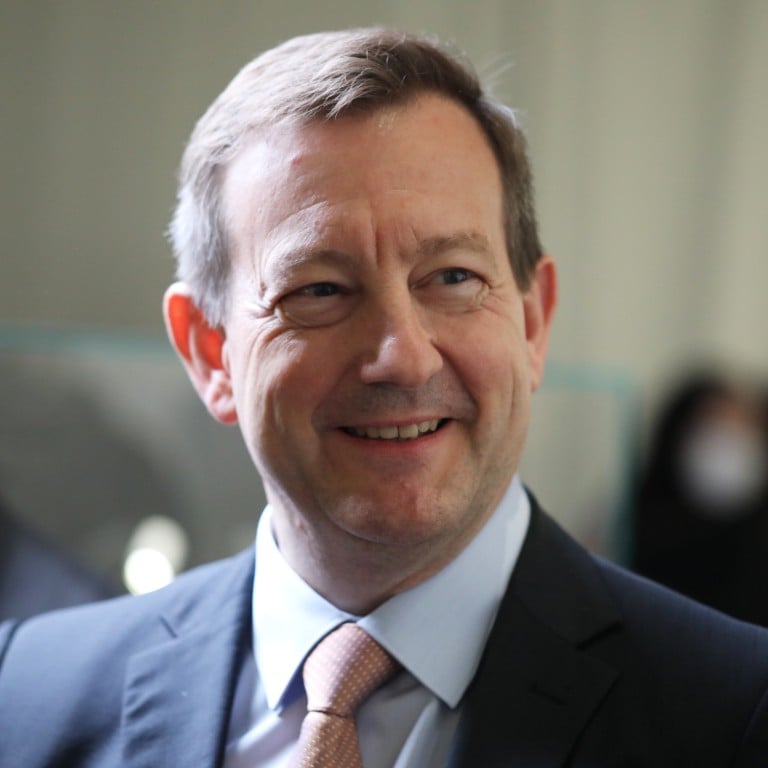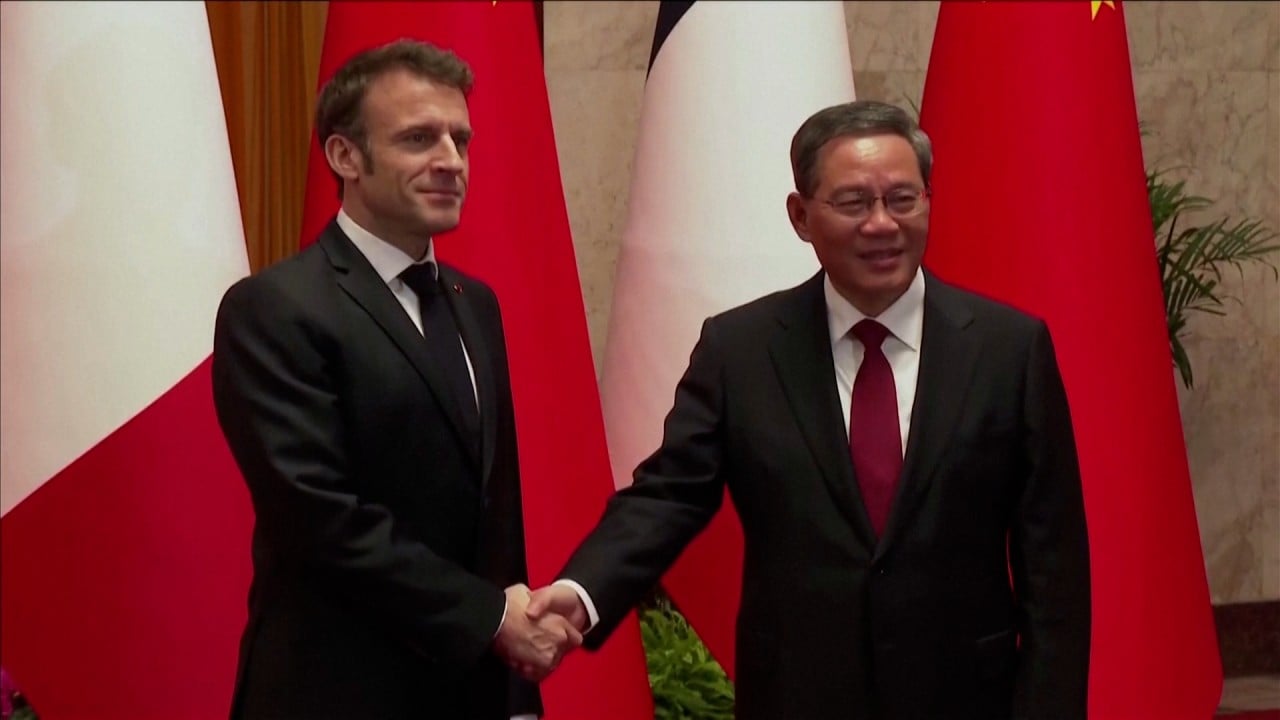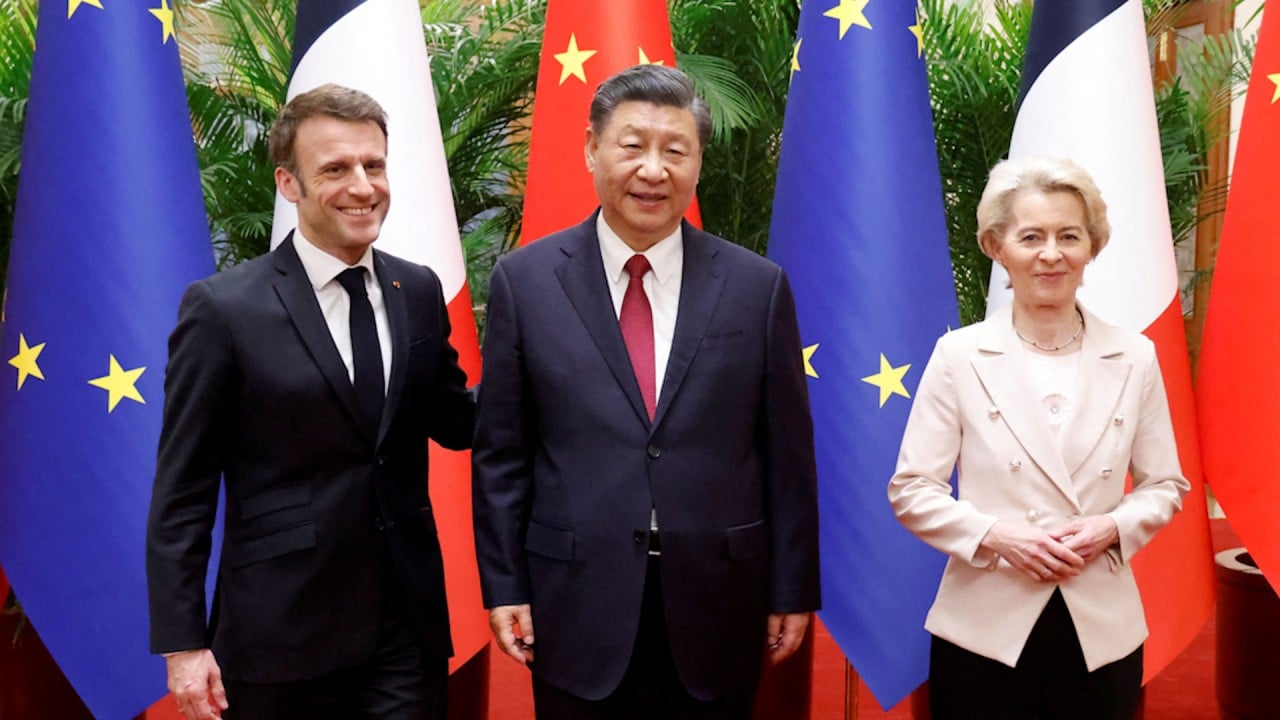
Exclusive | France, Europe engage with China on their terms, in their own interests: envoy
- French ambassador to Beijing Bertrand Lortholary says ‘sovereignty is paramount’ and that a strong Europe is good for China
- In a wide-ranging interview with the Post, the senior diplomat expresses hopes for closer cooperation on Ukraine, Gaza and the climate
A year after taking up his appointment as French ambassador to China, Bertrand Lortholary sits down with the Post to share his views on China-France relations – from trade frictions and technology competition to cooperation in global challenges, as well as people-to-people exchanges and the celebrations that will mark 60 years of diplomatic ties between the two countries.
In a lot of ways, France is important to China, not only because economically it is a great partner but also in the political and cultural realms. This year, the two sides will have more exchanges. In this context, what are your expectations for 2024?
The French minister for Europe and foreign affairs, Stéphane Séjourné, was in Beijing on April 1 to celebrate this anniversary.
Not only did he hold very productive talks with Premier Li and Foreign Minister Wang Yi, he also inaugurated the exhibition “Versailles and the Forbidden City” and the French cultural festival Croisements.
As far as we are concerned, we have set a very ambitious cultural programme in China for this year, with more than 300 major cultural activities in more than 30 cities. We want these activities to be as close as possible to the widest possible audience in China – in Beijing, Shanghai, Guangzhou, but also in Hohhot or Shenyang.
2024 is also synonymous with the Paris Olympic and Paralympic Games. France will host the entire world on that occasion, the same way China did in 2008 and 2022. We are very much looking forward to welcoming foreign athletes, including of course the top Chinese athletes.
What more can China do to help strengthen these relations? What do you expect from Beijing?
We – as a country and as a member of the European Union – want to make sure that our partnership with China bears fruit for the people of France and the people of China, but more broadly for the people of Europe and the people of China.
Chinese premier urges France to support ‘spirit of free trade’ in Europe
Taking the example of economic and trade relations, we want to make sure that we deepen our partnership in a way that makes the relationship more balanced, more sustainable for the future.
China is a major trade partner for France and Europe. Likewise, the European Union is a major partner, a major market for the Chinese economy.
We need to make sure that our companies compete but that they compete on a level playing field, with the same rules, the WTO rules. We also need to make sure that our companies get the same opportunities in the Chinese market that Chinese companies get in the European market. Minister Séjourné recalled this objective in Beijing last week.
At this point in time, you can tell by looking at the news that discussions are under way between the EU and China on trade. It is important for China to understand that what Europe is doing right now, Europe is doing for itself and for Europe’s future.
The EU is promoting its own interests and, when it comes to economic and trade issues, is willing to compete equally, be it with the US, with China, with everybody else. We are not doing it against anyone, certainly not against China or against whoever.
European sovereignty is paramount for our governments and our people. What we want now, and what we want for the future, is a strong Europe.
Not only do we think that this is in the interests of the European Union, we also believe that it is important for China to be in a world where Europe is a major pole of stability and fair trade.
Economics and trade are only one aspect of the question. There are many more. Of course, we want to engage even more with China on major world issues and crises, on Ukraine and the Middle East but also on global challenges – climate change, biodiversity, global health, sustainable development.
We have been doing that quite successfully when it comes to sustainable development. The fact that Premier Li, for instance, headed the Chinese delegation at the Paris Summit [on a new global financial pact] last year back in June, was a very positive and very strong signal – not only of the willingness of China to engage with us on that, but of our common capacity to work together again, not only for our two people, but also beyond China and France themselves.
China calls for all parties to ‘create conditions’ for Ukraine peace talks
We are two permanent members of the UN Security Council. It gives us rights, but [also] the duty to think more broadly and to make sure, as any member of the United Nations should, to respect the UN Charter and its core principles.
We know how important these principles are for our two countries. This provides us with a very strong basis to work together.
Let’s focus on biodiversity for an instant. Protecting biodiversity was a major commitment on the part of China when they hosted the Kunming Cop15 not so long ago, and France next year will be hosting a summit on the future of oceans.
There is a natural connection between the work that China has been doing in the context of its presidency of Cop15 and what we are going to do in the run-up to the 2025 summit.
EU’s China ‘de-risking’ plan targets AI, semiconductors, quantum tech, biotech
Our hope for the coming months is to work ever more hand in hand, France and China, to make sure that the ambitions – the collective and global ambitions that we have for our planet, for biodiversity and the oceans – are as high as possible. We are talking here about the future of mankind, no more, no less.
France has always been a very important source of capital, technology, and also know-how for China. But some people say that China is now focusing on upgrading its own technology. Some people worry that maybe it will lead to a structural competition between China and European countries. How will France handle this kind of dispute with China?
Upgrading technology is a good thing to pursue for all countries. Over the past 60 years, France has been present along the way of China’s economic reform and after 1978 to become a major partner of China’s development, in the fields of civilian nuclear energy and aeronautics, for example.
Now we want very innovative companies and more classical companies to be able to compete in a fair way. The same opportunities should be given to European and Chinese companies. When it comes to certain issues, there are measures that, in our opinion, do not follow this path.
‘No longer in favour’: European brandy ‘taboo’ in China amid import probe
Let’s take the example of the Chinese investigation into European brandies. The reality is that the issue is about cognac, which makes up more than 90 per cent of European brandies, more than anything else.
Launching this investigation is not the right answer in our opinion for several reasons. First of all, because agriculture is set to be a major priority for economic cooperation between our countries.
The Chinese president mentioned it as a top priority for France and China during his speech for the 60th anniversary of French-China relations. President Xi Jinping was also the one who put on the table, during the visit of President Macron, the initiative he himself called “from French farms to Chinese tables”.
In this context, the cognac industry has been engaged with Chinese partners for decades in commercialisation based on trust and quality of products, which are much appreciated by Chinese consumers.
China extends anti-subsidy duties on EU potato starch after bloc’s EV probe
Cognac is a major symbol for French citizens, which is why there was disappointment in France when the measure was taken. The investigation is ongoing and of course all companies are cooperating with the Chinese authorities.
Trade is a competence of the European Commission but we will also continue to have intense discussions with Chinese authorities on a national basis. We hope that this issue can be resolved as soon as possible.
We are living in a world full of uncertainties, with a lot of challenges. You mentioned Ukraine and Gaza. China and France don’t always have the same positions but they have both called for peaceful resolutions. How can the two countries work together?
I will start with Ukraine. The war of aggression that Russia started more than two years ago is a vital threat for European security. This is why we have, in Europe and in France, had a constant position on the issue ever since the war started.
We will continue to support Ukraine for as long as it takes to make sure that Europe’s long-term security interests are preserved. There will be no fatigue in Europe’s willingness to defend its interests. The French parliament showed massive support for this course last month.
Beyond Europe’s security, what we are talking about is the world order. All of a sudden, a permanent member of the Security Council – who should be, alongside the four others, helping to sustain the world order – breaks the rules and violates the UN Charter’s core principles of territorial integrity and sovereignty.
This particular conflict is taking place in Europe but has consequences everywhere. It is damaging Ukraine, with massive human rights violations. Beyond that, this conflict has far-reaching consequences for the whole world, including China.
More than ever, it’s our responsibility to work for solutions that should respect the core principles of the UN Charter.
Given its proximity to Russia, we do believe that China has a crucial role to play, to work with all of us in finding a peaceful solution based on the UN Charter.
We have had intense consultations with China on the issue, including at the top level, for the past two years. And just recently, as you know, special representative Li Hui travelled to Europe. Minister Séjourné discussed it with Foreign Minister Wang on April 1.
As West wobbles on Ukraine war, China’s envoy kicks off European tour
We also have to find ways to prevent direct or indirect contributions fuelling the Russian war economy, particularly when it comes to certain items or equipment that could directly contribute to the Russian war industry. We have to make sure that no company in the world provides weapons or key technology to Russian military forces.
On the Middle East, the humanitarian crisis unfolding in Gaza is catastrophic. It is creating an unacceptable situation.
While we remember Hamas’ October 7 unjustifiable terror attacks against Israel, we support a lasting and sustained humanitarian truce, eventually leading to a ceasefire, and of course to work towards a political resolution based on a two-state solution.
France has been extremely mobilised, organising an international conference on November 9 which enabled us to mobilise €1 billion (US$1.08 billion) for the people in Gaza, including €100 million (US$108 million) on the part of France.
We have been mobilising logistical support, particularly via our air force, to ensure the delivery of humanitarian aid and we have also been extremely active within the Security Council and at the General Assembly of the United Nations.
China also has a major role to play. We want to coordinate even more between France and China, following up on Foreign Minister Wang’s visit to Paris in February.
We expect China to be very active in avoiding a regional escalation, particularly by sending messages to Iran and, of course, to be very active on the humanitarian front. Any aid we can gather for the population of Gaza will be needed.
France has historically and traditionally had a very big influence in Africa and China is also one of Africa’s major partners. How do you describe the relationship between China and France in Africa?
We have a common interest, China and France, in seeing our African partners enjoy stability, security, economic and social opportunities. On that topic we have regular consultations and no competition.
How the political seeds of China’s growing Africa ties were planted long ago
Before Covid-19, France was one of the most popular destinations for Chinese tourists. A lot of Chinese students used to go to France to study. The pandemic disrupted this. How can the two sides do more, particularly for Chinese students?
From the beginning, it has been a shared ambition for people-to-people exchanges to be at the core of our relationship.
As far as students are concerned, the number of Chinese students in France is already almost back to what it was in 2019, with more than 25,000 Chinese students in France. We have already started extending the visa validity for former Chinese students, for they are ambassadors of one country vis-à-vis the other.
China-France relations: Beijing keen to make up for lost time after Covid
The other way around, we had about 10,000 French students studying in China before Covid. Today, these numbers are much lower. We want to make sure in the coming months to find the right ways to attract French students to China again.
We’re talking about the men and women who will be driving the relationship in 20 or 30 years’ time. We want to build for the future by trying to get back – and possibly go beyond – the number of students that we had in China before Covid.
It’s essential for young French men and women to understand what is going on in China right now, its development, its opportunities, its difficulties. We also want students to cover all domains – we want future engineers but we also want artists, political researchers, human sciences researchers.
When it comes to tourism, it is not only essential for the economies of our two countries, it is also a way for our people to know the reality of our two countries.
Japan, UK yet to make the cut as China lifts visa rules for Europe, Asia. Why?
Gradually the air connectivity between China and France has picked up and we have made sure, after three years, that visa requests can be treated efficiently. We expect the Paris Olympic and Paralympic Games to be a strong boost for tourism.
Surveys have shown that the willingness of Chinese tourists to visit France is very high. We are working hard to welcome them in the best conditions, including for their security, and to make them discover new cultural and leisure opportunities.
As far as the France-China Year of Cultural Tourism is concerned, more than 300 events in more than 30 cities are planned. We want to cover as much territory as possible and to somehow get as close as possible to the Chinese public, wherever this public is.
We want French culture to be accessible and not only for elites from major urban cities, we also want it to be widely accessible to the whole public.
43 per cent of Chinese see US ‘very unfavourably’ as Europe pulls ahead: survey
As I mentioned, one of our main events started on April 1 in the presence of our Foreign Minister Séjourné – an exhibition at the Palace Museum of top-level Versailles artefacts from the 17th and 18th centuries that were influenced by China, already back then. We are talking of 60 years of relationship, but in fact our relations go back much longer.
Other top-level French institutions will come to China, such as the Comédie-Française. We will also have shows including very popular musicals from France – Les Misérables and Notre-Dame de Paris, which by the way was a major hit during the CCTV Lunar New Year Gala. We want people to connect. That’s the present and that’s the future.
France has a big presence in the Indo-Pacific, with a lot of nationals and thousands of troops. At the same time the Indo-Pacific is a place with tension and future possibilities of conflict. What is France’s position on issues like the Korean peninsula, Taiwan and the South China Sea?
We see tensions rising in this part of the world and this is an issue of concern. For France, the number one priority is that we work in such a way that these tensions do not escalate in any possible way.
EU looks to Japan for defence pact amid ‘worrying shift’ in regional dynamic
We certainly do not seek or favour any logic of confrontation. What we want is to make sure – and this is the core of our national Indo-Pacific strategy and the EU’s as well – that we work with the countries of the region to advance common interests: economic cooperation but also cooperation on global issues and people-to-people exchanges.
We ourselves are a country of the Indo-Pacific. We have about 2 million French citizens living in that part of the world, we have territories in both the Indian and the Pacific oceans.
The key issue for us is to make sure that in that part of the world, as elsewhere – I was referring to Ukraine a moment ago – the sovereignty of all states is respected.
To this end, we have international law-based architecture in place and more than ever we see how important it is to preserve this architecture, including the United Nations Convention on the Law of the Sea.
What is your take on the recent adoption of a national security law in Hong Kong?
The European Union, on behalf of its member states, clearly expressed on March 20 our common concerns on the legislation. We fully stand by this declaration.





